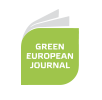Am 14. März habe ich einen Artikel bei euractiv veröffentlicht zum europäischen Wahlkampf und die Entscheidung der österreichischen und deutschen Fernsehsender bei den Debatten der Spitzenkandidaten nur die Kandidaten der EVP und S&D teilnehmen zu lassen. Falls von Interesse, könnt ihr hier den Artikel lesen.
Election debates: Democratic competition or political oligopoly?
The European election campaign is slowly heating up. All the major European political families have nominated their ‘Spitzenkandidaten’. Chances are that this year’s European elections will be more ‘European’ than any other before; which is to say that European issues, and the alternative between the different European orientations which European party families are going to offer to the electorate, will play a larger role than five or ten years ago.
There also is a discernible increase in interest in this election from many societal groups, institutions and the media. Anti-European populism has been awakening, but it the vast majority of European citizens still support. European unification. Instead of being the rabbit that stares at the populist rattle snake, we should value this campaign season as an opportunity to reinvigorate the European dream.
At any rate, a more vibrant European democracy is what’s needed for this reinvigoration. By making the nomination of the next president of the European Commission conditional on a majority of the European Parliament (which either of the leading candidates will have to muster), the political relevance and strength of the European Parliament will certainly increase. That can only be good for European democracy.
However, here comes the bad news. Austrian and German TV channels (ORF, ARD and ZDF) have agreed that they will only televise a presidential debate between the Socialist and the People’s Party candidates. This is an arrogant decision and it undermines all efforts to strengthen the European Parliament.
S&D and EPP will be afforded a privileged opportunity to present to the electorate, as if only those two voices count. Let me raise some facts that could or should have been considered: neither EPP nor S&D, according to the polls, can expect to achieve more than 30% of the votes. According to numbers in Brussels and Strasbourg, together they will not have a sufficient majority on all legislative purposes.
To state the obvious: without the support from liberal, Green or left MEPs neither the EPP or S&D spitzenkandidaten will be able to put together a majority in the European Parliament to support his claim to the office of the Commission President. Without the support of at least a third party group, a lot of laws might not pass in the next legislative period.
The voices, ideas, and proposals of the smaller political groups will definitely play a role in the next European Parliament, in the election of the Commission President, in the composition of the Commission, in the program of the next commission and in everyday legislation. But this situation in the European Parliament is being made invisible by ORF, ARD and ZDF when they present only two voices. They deny their audience even a glimpse of the pluralism that will dominate the next European Parliament.
Decades ago, both in Austria and in Germany, the Socialists and the People’s Party would have shared almost 90% or more of the votes between them. This is now ancient history. For public TV channels to ignore this fundamental change and act as if no other relevant political actors should be taken into account demonstrates a lack of understanding and of respect for democracy.
Euractiv, http://www.euractiv.com/eu-elections-2014/democratic-competition-political-analysis-534163

















